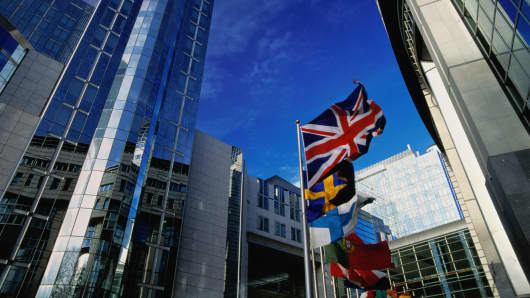The European Union without Britain would be like "fish without chips", the prime minister of Finland said on Wednesday as he made a detailed case for Britain remaining a strong and influential player in Europe.
Speaking two days before Prime Minister David Cameron delivers a much-anticipated speech setting out how he wants to change Britain's relationship with the European Union, Jyrki Katainen said he was sure the British would not abandon Europe.
"We all need a strong Britain in the EU," he told a small group of journalists in an interview in Brussels.
"I'm quite confident that major British politicians and the people think that they should be at the heart of Europe," he said, adding:"The EU without Britain is pretty much the same as fish without chips. It's not a meal anymore."
Katainen listed Britain's competitive economy,its role in shaping the single market, its strong free-trade history and its broader global influence as reasons why the country was an essential part of the European project.
But he also cautioned that Cameron could not expect to pick and choose which pieces of EU legislation he wanted to adopt and which pieces he did not like.
"When being a member in the European Union and especially in the single market, you cannot pick the raisins from the bun," he said, adding that it was not clear to him which issues Britain could easily drop and which it was ready to keep.
"It's very difficult to say what could be the competencies that could be repatriated. I don't know exactly what they could be," he said.
"When looking at Britain and its role in the world, it has benefited a lot from an integrated Europe, and I'm really sad that the debate has gone so far in the UK that some people there are seriously thinking of leaving the EU."
Katainen also addressed an issue close to Finland's heart that has proved a stubborn sticking point for the euro zone since June last year: how to treat "legacy" banking problems in countries such as Ireland and Spain.
Euro zone countries have agreed that problem banks in euro zone countries can be directly recapitalized by the region's bailout fund once the European Central Bank (ECB) is fully established as the single supervisor for the whole banking sector.
But Finland, in a position that has drawn support from the Netherlands and Germany, has argued that existing problems should not fall under the new regime, which would apply only to countries that have banking problems in the future.
That would mean Spain and Ireland would not be able to recapitalize their banks from the ESM permanent bailout fund.
"I just try to find solutions on what to do with the legacy assets, but as we have said earlier we don't like the idea that we changed the rules of the game in the middle of the game," Katainen said, when asked about the "legacy assets" issue.
"This is an issue that will be dealt with by the summit in June this year," he said. Asked if Germany and the Netherlands still stood close by Finland on the issue, he replied:
"We have not been talking with the two other countries on the Irish case or more generally legacy assets.
"But I think we are very close to each other,direct capitalization can be used only once the European banking supervision is up and running, but as I said this is an issue which will be dealt with later on this year."
Katainen also emphasized the need for a strong and comprehensive system for resolving bad banks in Europe, saying the mentality of leaders had to shift from bailing out banks to ensuring that investors and owners of banks were'bailed in'.
Only then would taxpayers be protected from having to carry the cost of bailouts, and the link could be broken between the debts of problem banks and the debts of sovereign countries.
"Most of the future bank crises, we could solve with the bail-in principle. The investors and owners of the banks must be in the first row of being responsible for the banking trouble.
"This should be a kind of normal rule and only in rare, exceptional occasions should public money be used."


